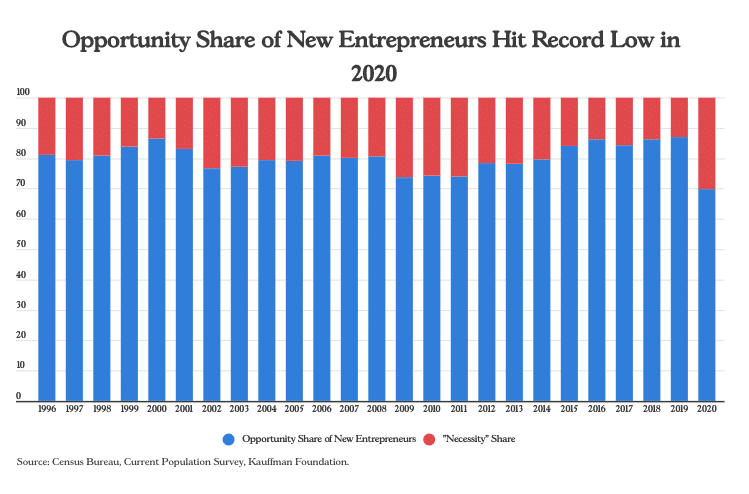The other day I was searching for some data on how many more businesses were being launched during Covid vs. pre-Covid. The numbers are way up by the way. In the process, I came across a term that I was familiar with but hadn’t thought much about. The term is “necessity entrepreneur.” It’s not a new term or concept. But it’s important to look at now as there are more of them out there than ever before.
Some people start businesses or become “solopreneurs” because it’s their dream. Because their ambition is matched only by their fierce independence. These are the people, to cite the cliche, who willingly work 80 hours a week to avoid working 40 hours a week. These are the “opportunity entrepreneurs”.
We all know these people. Our culture worships them. The very best of these entrepreneurs cap off their careers with brief suborbital flights in dubious-looking rockets.
Necessity entrepreneurs, on the other hand, are the reluctant warriors of the business world. We all see the LinkedIn notifications. “Congratulate Belinda Smith for her new role as CEO of Belinda Smith LLC”. I usually put Belinda in the “necessity” column. A lot of franchise owners also fall into this category. How much forced early retirement money has been funneled into Quiznos franchises over the years? I don’t know off-hand. Bet it’s a big number.
Necessity entrepreneurs also populate the lower end of the income spectrum. And many minority and women-owned businesses are so-called “necessity” businesses.
A Binary View of Entrepreneurship
We came across this binary view of modern entrepreneurship in a May 2o21 report from the Bipartisan Policy Center. The report mined Census Bureau data for insights on new business formation in the Covid era.
According to this report, in Q1 this year, new business applications were coming at double the pre-Covid pace. On average, 450,000 new business applications were filed with the government each month through Q1 2021. That is more than 2X the pre-COVID monthly average, according to the BPC report, which sources Census Bureau data. The report adds, “Since July 2020, the monthly average for new business applications has been 90 percent higher than the pre-pandemic average from 2004 to February 2020.”
The report also shared something we found particularly interesting. In 2020 the percentage of new businesses deemed “necessity” vs. “opportunity” businesses is the highest it has ever been at 30%. So just under a third of recent new business formations came from the reluctant warriors of the startup world. We should note this data reflects what was happening in 2020, during the depths of the pandemic. It will be interesting to see if this shift holds in 2021 and beyond.
“With millions of Americans entering unemployment in 2020, many turned to self-employment to try to make ends meet,” the BPC report notes. “This finding accords with another insight from the BFS data: there were twice as many business applications from likely nonemployers in the first part of 2021 than from likely employers.”
Temporary Shift?
Let’s just assume for a moment that this is a fundamental shift. And we are now a nation where a much bigger share of its entrepreneurs are reluctant warriors. Is this good, bad, or neutral?
It’s easy enough to make the “bad” argument. Entrepreneurship isn’t for everyone. “Necessity” entrepreneurs lack the swagger that leads to space rides in cowboy hats. Most will fail and look for whatever jobs they can find, or barely eke out livings as freelancers or gig workers.
But there may be a more positive take on these reluctant warriors. Swagger is a two-sided coin. It may take some swagger to build a unicorn. But it also takes swagger to light billions of someone else’s money on fire in pursuit of ideas that make no sense. (We’re looking at you, Adam Neumann.)
Data Offers a Look at U.S. Small Business Recovery Trends by City
And not all necessity entrepreneurs are ex-middle managers now making toasted sandwiches. Plenty of necessity entrepreneurs have gone on to build massively successful companies. You don’t need to build a unicorn to create wealth.
Some factors and attributes come in handy for these necessity entrepreneurs. First, “necessity” implies that failure is not an option. This realization has a tendency to steel one’s spine. Even among those who lack the mythical swagger everyone seems to covet in an entrepreneur. Humble people can hustle too.
It’s also a gift to be able to know what you don’t know. And it’s a bigger gift to not let pride get in the way of seeking help where you are weakest. Companies serving the small businesses market, and in particular those addressing newly formed businesses, should keep these thoughts in mind. Offering a helping hand to a new business now may pay off as it has never before.
So here’s to the reluctant warriors. Let’s see what they come up with.






